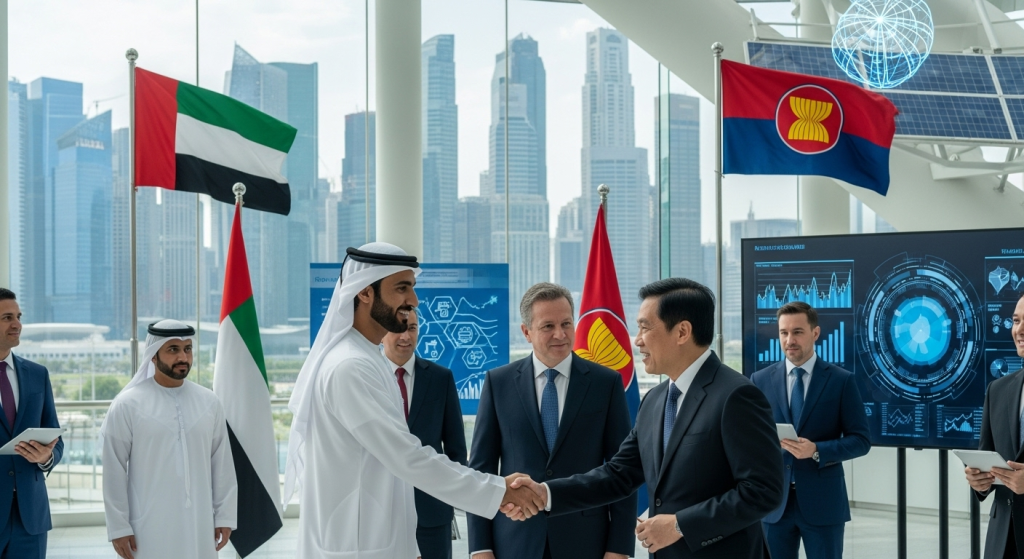The United Arab Emirates (UAE) is making significant strides in expanding its trade relationships, particularly with the Association of Southeast Asian Nations (ASEAN). This strategic move is aimed at enhancing economic cooperation, facilitating investment opportunities, and fostering a robust trade environment. As the UAE continues to diversify its economy beyond oil dependency, the focus on ASEAN countries presents a promising avenue for growth.
Understanding the ASEAN Market
ASEAN, comprising ten member states including Indonesia, Malaysia, Singapore, Thailand, and Vietnam, represents a combined market of over 650 million people. This region is characterized by rapid economic growth, increasing consumer demand, and a young, dynamic workforce. The UAE’s engagement with ASEAN not only opens up new markets but also aligns with its vision of becoming a global trade hub.
Key Economic Indicators
- ASEAN’s GDP growth rate has averaged around 5% over the past decade.
- The region’s middle-class population is expected to reach 400 million by 2030, driving demand for various goods and services.
- ASEAN’s strategic location offers access to major global shipping routes, enhancing logistical advantages.
Recent Developments in UAE-ASEAN Relations
In recent months, the UAE has taken proactive steps to strengthen its ties with ASEAN nations. High-level meetings, trade missions, and bilateral agreements have been pivotal in this process. Notable developments include:
1. Trade Agreements
The UAE has signed several trade agreements with ASEAN countries aimed at reducing tariffs and enhancing trade facilitation. These agreements are designed to promote exports from the UAE, particularly in sectors such as technology, renewable energy, and food security.
2. Investment Initiatives
Investment initiatives have also been a focal point, with the UAE encouraging its businesses to explore opportunities in ASEAN markets. The UAE government has established investment funds and incentives to attract foreign direct investment (FDI) from ASEAN nations, particularly in infrastructure and technology sectors.
3. Trade Missions and Networking Events
Trade missions have been organized to facilitate direct engagement between UAE businesses and their ASEAN counterparts. Networking events, exhibitions, and trade fairs have provided platforms for showcasing products and services, fostering partnerships, and exploring joint ventures.
Sectoral Opportunities for UAE Businesses
As the UAE forges closer ties with ASEAN, several sectors stand out as having significant potential for business expansion:
1. Technology and Innovation
The digital economy in ASEAN is booming, with increasing investments in technology startups and innovation hubs. UAE companies specializing in fintech, e-commerce, and digital solutions can tap into this growing market.
2. Renewable Energy
With a shared commitment to sustainability, the UAE and ASEAN countries are exploring collaborations in renewable energy projects. The UAE’s expertise in solar and wind energy can significantly benefit ASEAN nations looking to transition to cleaner energy sources.
3. Food Security and Agriculture
Food security is a pressing issue in many ASEAN countries. The UAE’s advanced agricultural technologies and practices can support ASEAN nations in enhancing their food production capabilities, creating opportunities for partnerships in agribusiness.
4. Tourism and Hospitality
The tourism sector is another area ripe for collaboration. With the UAE being a popular destination for tourists from ASEAN countries, there is potential for joint marketing initiatives and the development of travel packages that promote both regions.
Challenges and Considerations
While the prospects for UAE-ASEAN trade relations are promising, several challenges need to be addressed:
1. Regulatory Environment
Diverse regulatory frameworks across ASEAN countries can pose challenges for UAE businesses seeking to enter these markets. Understanding local laws, customs, and trade regulations is crucial for successful market entry.
2. Cultural Differences
Business practices and consumer preferences can vary significantly across ASEAN nations. UAE companies must invest time in understanding cultural nuances to effectively engage with local markets.
3. Competition
ASEAN markets are increasingly competitive, with both local and international players vying for market share. UAE businesses must differentiate themselves through innovation, quality, and customer service.
Conclusion
The UAE’s strategic focus on expanding trade partnerships with ASEAN nations marks a significant step towards diversifying its economic landscape. By leveraging the unique strengths of both regions, businesses can unlock new opportunities for growth and collaboration. As the UAE continues to strengthen its ties with ASEAN, it is essential for companies to remain adaptable and proactive in navigating the evolving trade environment.
For more insights into investment opportunities and business strategies in the UAE, visit Persian Horizon.
Source: https://www.emirates247.com/business








